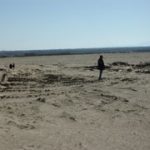Afghans have endured injustice for decades. Victims languish in an environment where abuses are committed with impunity, fueling resentment and the country’s conflict itself. Amnesty International recently published a report examining accountability for civilian deaths caused by international military operations in Afghanistan. The report focused on 10 incidents involving the U.S. military between 2009 and 2013 where civilians were killed under questionable circumstances. The investigation found that in 140 cases of civilian deaths, there was “abundant and compelling evidence of war crimes.”
Medical and forensic experts from Physicians for Human Rights (PHR) have witnessed similar abuses committed with impunity in Afghanistan. Between January and February 2002, PHR experts traveled to northern Afghanistan and reported on the horrific detention conditions facing surrendered combatants and an apparent mass grave in Dasht-e-Leili, where as many as 2,000 prisoners may have been buried. Following the fall of Kunduz in November 2001, these prisoners surrendered to the Afghan Northern Alliance under General Rashid Dostum and to the U.S. Special Forces supporting him. Allegations suggest that Dostum’s forces suffocated the prisoners in cargo containers and then buried the dead in Dasht-e-Leili, on the outskirts of the northern city of Sheberghan. Allegations by Afghan detainees suggest that U.S. troops were either present at the time or knew about the killings. In April 2002, under the auspices of the UN, PHR uncovered the remains of more than a dozen bodies and confirmed that the cause of death was consistent with asphyxiation. PHR repeatedly called for the full protection of and a thorough investigation into what appeared to be a mass grave site.
PHR returned to Dasht-e-Leili on behalf of the UN to survey the site in 2008. Upon arrival, PHR found that the area had been disturbed and large parts of the alleged mass grave site had been removed. The UN denounced this development, as the site and the evidence had clearly been tampered with despite recommendations for an investigation back in 2002.
While calls have been made over the years for an investigation into Dostum and his forces, allegations against the United States around Dasht-e-Leili have gone unanswered. PHR requested an investigation into U.S. involvement, but silence has generally prevailed, even when the Bush administration was accused of deliberately impeding investigations by four separate government agencies into the killings.
U.S. mainstream media has also failed to take the allegations seriously. Salon reported that the New York Times withheld information suggesting that U.S. troops were present during the massacre, fueling speculation that the U.S. government opposed any investigation into the massacre out of fear that evidence of its role would be exposed.
PHR has continued to call for a full investigation into what happened to the victims of the mass grave at Dasht-e-Leili. A thorough and independent investigation would send a signal to Afghans that no one is above the law – not even U.S. officials. In many ways, the Dasht-e-Leili mass grave demonstrates how both the international community and the government of Afghanistan have failed the Afghan people. The lack of justice reinforces the norms experienced by everyday Afghans: impunity for the powerful and tolerance for brutality. Ignoring what happened at Dasht-e-Leili signaled to the surviving families that the international community had no interest in providing Afghan citizens with the truth.
Afghans have a right to know what happened to those buried in the mass graves that dot their countryside, and peace cannot be achieved until justice is served – especially for crimes committed or countenanced by the United States. The U.S. government must be held accountable for violations committed in the countries in which we wage war, and the withdrawal of troops does not relieve us of this responsibility.

